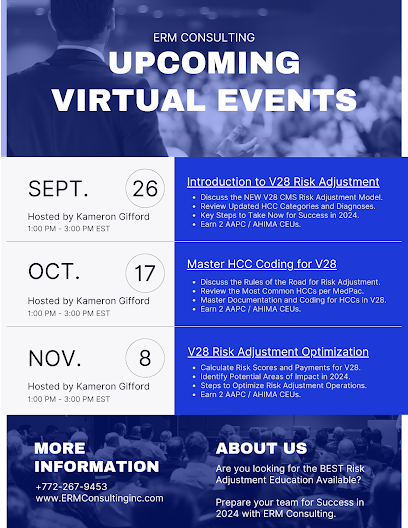
Contact us
We welcome your feedback! Please connect with us using any of the options below!
mHealthGames
email: kgifford@mhealthgames.com
Phone: 772 210-2823
mHealth Connect - For all your Questions
Please use the form below to submit your question, or to schedule an appointment.
Read our Blog...
Stay current on all the news that matters to you with our blog: MRA Alerts and Updates

NEW DATES ADDED - Prepare your TEAM for SUCCESS in 2024!!
Are you looking for the BEST V28 Risk Adjustment Education? If so, GREAT NEWS – you found it! Register today for the ALL NEW V28 Webinars. Only $29.99 each – receive a 10% discount when you purchase 3 or more tickets for any event. All webinars are approved for 2 AAPC / AHIMA CEUs.
Introduction to V28 Risk Adjustment
September 26, 2023, 1:00 PM to 3:00 PM
Registration Link: https://events.eventzilla.net/e/introduction-to-v28-risk-adjustment-2138616726
Agenda:
Discuss the NEW V28 CMS Risk Adjustment Model.
Review Updated HCC Categories and Diagnoses.
Key Steps to Take Now for Success in 2024.
Approved for 2 CEUs from AAPC / AHIMA.
Master HCC Coding for V28
October 17, 2023, 1:00 PM to 3:00 PM
Registration Link: https://events.eventzilla.net/e/master-hcc-coding-for-v28-2138616721
Agenda:
Discuss the Rules of the Road for Risk Adjustment.
Review the Most Common HCCs per MedPac.
Master Documentation and Coding for HCCs in V28.
Approved for 2 CEUs from AAPC / AHIMA.
V28 Risk Adjustment Optimization
November 8, 2023, 1:00 PM to 3:00 PM
Registration Link: https://events.eventzilla.net/e/v28-risk-adjustment-optimization-2138616723
Agenda:
Calculate Risk Scores and Payments for V28.
Identify Potential Areas of Impact in 2024.
Steps to Optimize Risk Adjustment Operations.
Approved for 2 CEUs from AAPC / AHIMA.
Visit www.ermconsultinginc.com to learn more.

Are you looking for the BEST V28 Risk Adjustment Education? If so, GREAT NEWS – you found it! Register today for the ALL NEW V28 Webinars. Tickets are $29.99 each – Bring the team and receive a 10% discount when you purchase 3 or more tickets for any event. All webinars are approved for 2 AAPC / AHIMA CEUs.
June 24, 2023, 2:00 PM to 4:00 PM – Introduction to V28 Risk Adjustment
Registration Link: https://events.eventzilla.net/e/introduction-to-v28-risk-adjustment-2138590700
Agenda:
Discuss the NEW V28 CMS Risk Adjustment Model.Review Updated HCC Categories and Diagnoses.Key Steps to Take Now for Success in 2024.Approved for 2 CEUs from AAPC / AHIMA.
July 22, 2023, 2:00 PM to 4:00 PM – Master HCC Coding for V28
Registration Link: https://events.eventzilla.net/e/master-hcc-coding-for-v28-2138590697
Agenda:
Discuss the Rules of the Road for Risk Adjustment.Review the Most Common HCCs per MedPac.Master Documentation and Coding for HCCs in V28.Approved for 2 CEUs from AAPC / AHIMA.
August 26, 2023, 2:00 PM to 4:00 PM – V28 Risk Adjustment Optimization
Registration Link: https://events.eventzilla.net/e/v28-risk-adjustment-optimization-2138590696
Agenda:
Calculate Risk Scores and Payments for V28.Identify Potential Areas of Impact in 2024.Steps to Optimize Risk Adjustment Operations.Approved for 2 CEUs from AAPC / AHIMA.Learn more www.ermconsultinginc.com

Is Your Team Risk Ready?Arm Your Team For Combat This Risk Adjustment Season!Prepare for Victory...
What will define those who claim victory and those who are defeated in the battle towards value based care? Will it be those organizations with the most money, power and seats at the table? Or will it be those who are nimble, flexible and open to change?
I believe it will be both. As victory will not be defined by the owners and head coaches but instead by how the players execute on the field. It will be the game time decisions that matter most. A quarterback who can read the defense and adjust accordingly will provide far greater value to the offense than the most athletic quarterback who misses the blitz every time.
Perhaps Napoleon said it best, "Battles are won by the power of the mind." For in a game of inches, the winners and losers will be defined by those who can execute in the moments that matter most. Prepare your team for victory with information at the point of care!
Learn more - https://erm.ecwid.com/
ORDER TODAY - THESE WILL GO FAST!!
CMS-HCC Coding Cards
https://erm.ecwid.com/2022-CMS-HCC-Coding-Cards-12-Pack-p432478501
You will love these 5x7 HCC Coding Cards!
Updated for 2022 - Version 24
This 14 pack is perfect your next risk adjustment project.
1.Diabetes:
•ICD-10 Coding Tips (side 1) includes RAF
•Clinical Documentation Tips (side 2) includes RAF
2.COPD:
•ICD-10 Coding Tips (side 1) includes RAF
•Clinical Documentation Tips (side 2) includes RAF
3.Heart Failure:
•ICD-10 Coding Tips (side 1) includes RAF
•Clinical Documentation Tips (side 2) includes RAF
4.Major Depressive Disorder:
•ICD-10 Coding Tips (side 1) includes RAF
•Clinical Documentation Tips (side 2) includes RAF
5.Malnutrition and Morbid Obesity:
•ICD-10 Coding Tips (side 1) includes RAF
•Clinical Documentation Tips (side 2) includes RAF
6.Complications with Internal Devices and Dependence:
•ICD-10 Coding Tips for Complications (side 1) includes RAF
•ICD-10 Coding Tips for Dependency(side 2) includes RAF
7. Infectious Disease:
•ICD-10 CDI / Coding Tips for HIV and Sepsis (side 1) includes RAF
•ICD-10 Coding Tips for Liver Disease (side 2) includes RAF
8. Heart Failure:
•ICD-10 Coding Tips (side 1) includes RAF
•Clinical Documentation Tips (side 2) includes RAF
9. Chronic Kidney Disease:
•ICD-10 Coding Tips (side 1) includes RAF
•Clinical Documentation Tips (side 2) includes RAF
10. Seizures and Neurological Disorders:
•ICD-10 Coding Tips (side 1) includes RAF
•Clinical Documentation Tips (side 2) includes RAF
11. Diseases of the Digestive System:
•ICD-10 ICD-10 Coding Tips (side 1) includes RAF
•ICD-10 ICD-10 Coding Tips (side 2) includes RAF
12. Primary and Secondary Neoplasms:
•ICD-10 ICD-10 Coding Tips (side 1) includes RAF
•ICD-10 ICD-10 Coding Tips (side 2) includes RAF
13. Coagulation Defects:
•ICD-10 Coding Tips (side 1) includes RAF
•Clinical Documentation Tips (side 2) includes RAF
14. Disorders of Immunity
•ICD-10 Coding Tips (side 1) includes RAF
•Clinical Documentation Tips (side 2) includes RAF
Post one to your bulletin board, stick one near the EHR or tape it to your workstation!
HCC Coding Cards are made to last all year on thick 16 pt cardstock with a gloss finish.
Order for your team today!
CMS-HCC Quick Coders
https://erm.ecwid.com/2022-CMS-HCC-Quick-Coder-p432456253
Completely updated for 2022 - Version 24
This 42 page guide contains everything you need to calculate a risk score in one place!
Includes of the most common HCC codes in the Medicare (CMS-HCC) model.
This guide was designed for providers, with codes sorted alphabetically rather than by code.
Order one for the entire team today!
Includes:
List of ICD-10 Guidelines270 ICD-10 Codes (Rx and HCCs)Quality CPT II codes for MIPS / MACRAAll CMS-HCC Risk Factors (includes demographic, disease and interaction)Trump ChartLearn more / order here - https://erm.ecwid.com/

